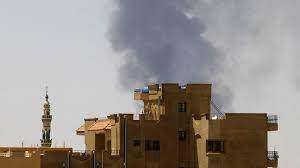With temperatures soaring to more than 40C at this time of the year, I normally sleep outside in my garden, but I am too scared to do that now, as fighter jets roar over my home in Sudan’s Omdurman city – despite the latest ceasefire.
I live with my mother and siblings in the centre of Omdurman, just over the River Nile from the capital, Khartoum.
The fighter jets are a constant reminder that Sudan is now in a state of war. I cannot get used to their terrifying sound.
The fighting between the Sudanese army and the paramilitary Rapid Support Forces (RSF) is all around us – to our north, south, east and west.
It came close to our home on Monday afternoon, when a bullet ripped through the roof of my neighbour’s house, hitting her leg while she was asleep. Fortunately, she was not seriously wounded.
We heard loud noises – boom, boom, boom – a short while earlier. We think it was anti-artillery fire, but are not sure. We hid in our homes, as it is too dangerous to even look out of our windows.
From morning to evening, ceasefire or no ceasefire, fighter jets fly past our neighbourhood, coming from the same military airport from where foreign nationals have been evacuated, and heading towards Khartoum to strike at positions of the RSF.
From all the reports I have received, most of Khartoum is controlled by RSF fighters, with hardly any army soldiers – or police officers – on the streets.
The RSF fires anti-aircraft artillery to try and bring down the fighter jets, but I am not aware of any aircraft that has been shot down.
Three days ago, some of the projectiles landed in an open field in my neighbourhood. Luckily, they missed a nearby mosque and homes.
The RSF has its origins in the war that broke out in Darfur two decades ago, and is made up of the Janjaweed militiamen who helped the government crush a rebellion there.
It had around 20,000 men before the fall of long-time ruler Omar al-Bashir in 2019, but has since turned into a force with an estimated 80,000 to 100,000 fighters.
It built a strong presence in cities and towns across Sudan, but many of its fighters have now been deployed to Khartoum as RSF commander Gen Mohamed Hamdan Dagalo, better known as Hemedti, fights army commander Gen Abdel Fattah al-Burhan for power.
The city is dotted with checkpoints, manned by RSF fighters in pick-up trucks.
Hamid Khalafallah, from the Tahrir Institute for Middle East Policy, told the BBC’s Newsday programme that people risk their lives every time they have to negotiate their way past.
“It’s basically a gamble. Sometimes they let you through, sometimes they don’t. Sometimes they shoot at you, sometimes they steal your things and it’s very random,” he said.

The fighting has been most intense around the international airport, presidential palace, and the military headquarters.
All my friends who lived in these areas have fled – some of them making a long and arduous road journey to Egypt, not lucky enough to be evacuated, like foreign nationals, in specially chartered planes.
I have decided to stay, as my neighbourhood is one of the safest, but I do not know for how long.
A relative of mine, in her early 30s, has died of dengue fever. She was supposed to have got married this month, but died because she could not get treatment as hospitals were either shut or treating only those with gunshoots.
The Omdurman Teaching Hospital is one of the biggest in Sudan, but it is operating at minimal capacity.
Many doctors are unable to get to the hospital, as it is too dangerous for them to travel.
Along with the breakdown in health services, there is a water and electricity crisis.
Some residents have not had water in their homes since fighting broke out on 15 April, forcing them to rely on the wells of neighbours for their supply.
We are all hoping that the war ends soon, but our biggest fear is that former Prime Minister Abdalla Hamdok could be proven right, with Sudan descending into a civil war worse than those in Syria and Libya.

